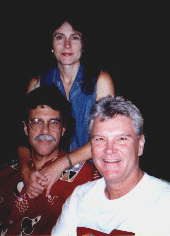 "A Bit
of Background on the CW2K Strands"
"A Bit
of Background on the CW2K Strands" "A Bit
of Background on the CW2K Strands"
"A Bit
of Background on the CW2K Strands"
We were looking for a different approach, a different way to organize the CW2K presentations. Two years prior to our conference, at the CWC98 in Gainesville, FL, members of the Computers and Writing Community expressed an interest to reach out to businesses and industry, as well as to other disciplines, and to forge relationships that would enhance the promotion of computer technology for teaching, learning, and research. We took what our colleagues said to heart and made this initiative our mission and, in doing so, opened our conference, the Computers and Writing 2000 Conference, to groups and businesses not traditionally represented or emphasized.
The tricky part of following a politics of inclusion is organization and structure. The generative question that drove us to change the tradition established for conference organization was: How could we invite, represent, and make to feel welcome new groups and businesses into our community without losing the camaraderie so prevalent among us and a cohesive structure to the program so necessary for a successful conference?"
Of course, the answer lay in the notion expressed by our conference theme, "Evolution, Revolution, and Implementation: Computers and Writing for Global Change." We had to change the conference organization in order to emphasize and draw attention to the various threads or strands of thought generating from and outside our community. For me, representing all presentations in equal measure in a conference program, no matter what different perspectives they take, suggests some sort of implied homogeneity that really doesn't exist. Could we deliver this notion of sameness to our community, a community that shares many pedagogical beliefs and technological interests but one that also prides itself for its distinctiveness and individualism? More importantly, did we really want to? A politics of inclusion, at least for us, does not imply uniformity but equal gravity, and access to expression. So amid this theorizing and philosophizing were born the Strands.
A simpler view of the Strands is that they allowed a more thorough investigation of a particular area of study or concern among interested parties than is generally possible within a traditional conference organization.
The final result was a series of special sessions 1) focusing on computer-mediated teaching for all levels of education---Teaching with Computers, K-College---and for disciplines other than English or Rhetoric and Composition---Communicating Across the Curriculum; 2) redefining literacy to include tools of new media---Technology and Literacy; 3) emphasizing groups considered outside of the traditions of academe and masculinized notions of technology---Feminism and Technology and Queer Studies; and 4) highlighting varying uses of MOOs---the MOO Research Forum. These Strands were held on Friday and Saturday of the conference and were scheduled for a half or a full day."
Before we end our note, we need to say that the Strands concept is not new and has been utilized by other conferences such as the National Council of Teachers of English (NCTE), among others. So, in creating Strands for the Computers and Writing Conference, we simply borrowed a concept proven to be successful for a large venue of 5000 participants for our smaller organization of 400-500 people as a way to highlight our interests and diversity.
Follow the links to the various webtexts created by presenters of these Strands and to some of the documents we have preserved from the conference about them. Dene has also included a narrative about the problems and successes she encountered in the hopes that such a narrative would assist future conference organizers when pursuing this type of structure.
Go to Strands Hyperlinks --->